初中英语七年级下册Unit 7 单元重点语法
七年级下册英语unit7知识点总结

七年级下册英语unit7知识点总结Unit 7的主要内容是关于地理和旅游方面的词汇及句型。
在这个单元里,我们将学习如何询问地点、问路、谈论交通工具、描述旅游景点并提出建议等。
一、地点询问地点:1. Excuse me, where is the …? (对不起,请问……在哪里?)指路:2. Go straight on. (一直直走)3. Turn left/right. (向左/右转)4. It’s on your left/right. (在你的左边/右边)二、交通交通工具:2. bus (公共汽车)3. taxi (出租车)4. bike (自行车)5. subway (地铁)交通工具的用法:1. take the train/bus/subway (乘坐火车/公共汽车/地铁)2. catch a taxi (打出租车)3. ride a bike (骑自行车)三、景点旅游景点:1. museum (博物馆)2. park (公园)3. beach (海滩)5. river (河流)描述旅游景点:1. It’s a beautiful/interesting place. (这是一个美丽/有趣的地方)2. There are lots of things to see/do here. (这里有很多东西可以看/做)3. It’s worth a visit. (值得一游)提出建议:1. Why don’t we …? (为什么不……?)2. We could … (我们可以……)3. How about …? (……怎么样?)本单元的语法重点为情态动词should和can的用法,学生需要掌握其肯定、否定和疑问句形式的构成及用法。
1. should/can/must + 动词原形2. should not/cannot/must not + 动词原形3. 询问意愿:Can/Will you …? / Would you like to …?总结:正如以上所述,七年级下册英语unit7主要是涉及到了生活中的地理和旅游类的词汇和句型,包括询问地点、问路、谈论交通工具、描述旅游景点并提出建议等。
人教版七年级英语下册第七单元知识点总结
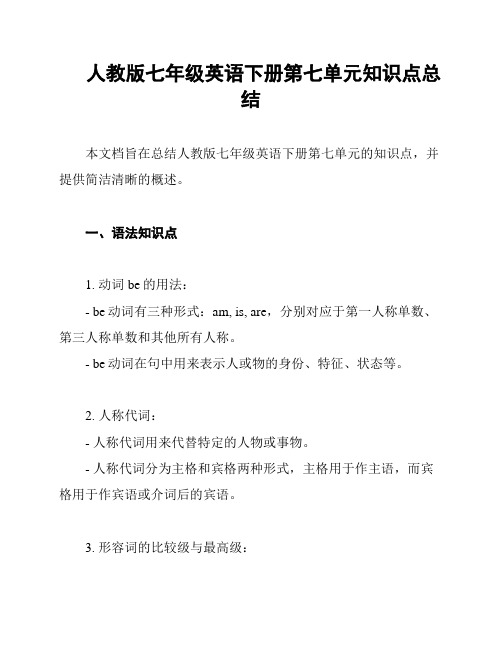
人教版七年级英语下册第七单元知识点总结本文档旨在总结人教版七年级英语下册第七单元的知识点,并提供简洁清晰的概述。
一、语法知识点1. 动词be的用法:- be动词有三种形式:am, is, are,分别对应于第一人称单数、第三人称单数和其他所有人称。
- be动词在句中用来表示人或物的身份、特征、状态等。
2. 人称代词:- 人称代词用来代替特定的人物或事物。
- 人称代词分为主格和宾格两种形式,主格用于作主语,而宾格用于作宾语或介词后的宾语。
3. 形容词的比较级与最高级:- 比较级用来对两个事物进行比较,最高级则用来对多个事物进行比较。
- 形容词的比较级一般在词尾加-er,最高级在词尾加-est。
- 有些形容词的比较级和最高级形式不规则,需要特别记忆。
二、词汇知识点1. 家庭成员:- 爸爸:father- 妈妈:mother- 哥哥:brother- 姐姐:sister- 弟弟:younger brother- 妹妹:younger sister2. 学校设施:- 图书馆:library- 实验室:laboratory- 体育馆:gymnasium- 教室:classroom- 游泳池:swimming pool三、交际用语1. 问候与告别:- 问候:Hello! / How are you?- 回答:I'm fine, thank you. / Not very well.- 告别:Goodbye! / See you later.2. 自我介绍:- My name is [姓名]. I am [年龄] years old. I am from [国家/城市].3. 询问与回答:- 询问:What's your name? / How old are you?- 回答:My name is [姓名]. / I am [年龄] years old.以上为人教版七年级英语下册第七单元的主要知识点总结,希望对您的学习有所帮助。
七年级英语下册unit7知识点

七年级英语下册unit7知识点Unit 7 of seventh grade English textbook focuses on describing past events and situations using the past simple tense. It also introduces some useful expressions to describe past experiences and offers opportunities for students to learn and practice using the target language. Here are the main knowledge points covered in Unit 7:1. Past Simple TenseThe past simple tense is used to describe finished actions, situations or events that happened at a specific time in the past. It is formed differently depending on the verb type:Regular verbs: add -ed to the base form of the verb (e.g. walk - walked, watch - watched)Irregular verbs: the past tense is formed in various ways, some verbs have different spelling, some use the same word as the base form (e.g. go - went, eat - ate)Negative sentences are formed using the auxiliary verb "did" in the past simple and the base form of the main verb (e.g. I didn't eat breakfast this morning.)Questions are formed using the auxiliary verb "did" and the base form of the main verb (e.g. Did you watch the TV last night?)2. Time expressionsIn order to give more precise information about when an event happened, certain expressions are used such as:Yesterday, the day before yesterday, last week, last month, last year, two days ago, ten minutes ago3. Useful expressions to describe past experiencesTo describe past experiences, some useful expressions can be used, including:I had a great time, it was fantastic/amazing, I enjoyed myself, It was fun, I loved it4. Listening and speaking practiceIn Unit 7, students have the opportunity to listen to and speak about past events using the past simple tense. They are guided through a series of activities that involve listening to people describe their past experiences and then sharing their own. Students are encouraged to use new vocabulary and expressions they have learned to describe their experiences.5. Reading and writing practiceIn the reading and writing section, students are asked to read a short story and answer comprehension questions, as well as write a paragraph about a personal experience. This provides students with an opportunity to practice their reading and writing skills, as well as using the target language to describe past events.ConclusionUnit 7 of the seventh grade English textbook provides students with a useful and practical introduction to using the past simple tense to describe past events and experiences. By practicing listening, speaking, reading, and writing, students will be able to gain the confidence and skills necessary to communicate effectively in English.。
人教版英语七下unit7单词、知识梳理、词汇句式精讲
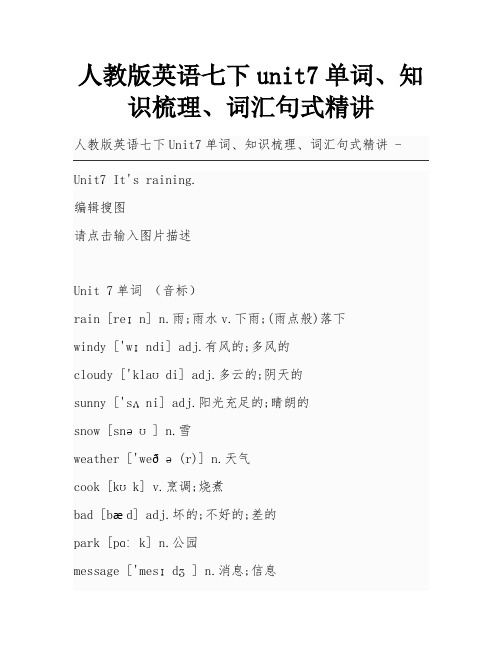
人教版英语七下unit7单词、知识梳理、词汇句式精讲Unit7 It's raining.编辑搜图请点击输入图片描述Unit 7单词(音标)rain [reɪn] n.雨;雨水v.下雨;(雨点般)落下windy ['wɪndi] adj.有风的;多风的cloudy ['klaʊdi] adj.多云的;阴天的sunny ['sʌni] adj.阳光充足的;睛朗的snow [snəʊ] n.雪weather ['weðə(r)] n.天气cook [kʊk] v.烹调;烧煮bad [bæd] adj.坏的;不好的;差的park [pɑːk] n.公园message ['mesɪdʒ] n.消息;信息him [hɪm] pron.他(he的宾格)could [kə d aux.可以;能;可能;can的过去式back [bæk] n.后面adj.向后的;后面的problem ['prɒbləm] n.问题;难题again [ə'ɡen] adv.再;又dry [draɪ] adj.干的;干燥的cold [kəʊld] adj.冷的;寒冷的hot [hɒt] adj.热的;辣的warm [wɔːm] adj.温暖的;暖和的visit ['vɪzɪt] v.拜访;参观Canada ['kænədə] n.加拿大summer ['sʌmə(r)] n.夏天;夏季sit [sɪt] v.坐juice [dʒuːs] n.果汁soon [suːn] adv.不久;很快vacation [və'keɪʃn] n.假期;休假hard [hɑːd] adj.硬的;困难的Europe ['jʊərəp] n.欧洲;欧盟mountain ['maʊntən] n..山;山脉;高山country ['kʌntri] n.国家;乡村skate [skeɪt] v.溜冰;滑冰snowy ['snəʊi] adj.多雪的winter ['wɪntə(r)] n.冬季;冬天Russian ['rʌʃn] adj.俄国的;俄国人的;俄语的snowman ['snəʊmæn] n.雪人rainy ['reɪni] adj.多雨的;下雨的Unit7 知识梳理【重点短语】1.How is the weather...?=What’s the weather like...? 天气怎么样?the rainy weather 在雨天3.talk about the weather with friends 和朋友谈论天气4.play puter games 玩电脑游戏5.watch TV 看电视6.How’s it going? 一切还好么?7.not bad 不坏,不错8. at the park= in the park 在公园9.sound like 听起来像10.have a good time 玩得开心;过得愉快11.study at sb’s home 在某人的家中学习12. take a message for sb. 为某人带消息13. tell sb. to do sth. 告诉某人做某事14. call sb. back (给某人)回电话15. no problem 没问题16. do one’s homework 做某人的作业17. right now 现在;立即;马上18. study English 学习英语19. have a great time doing 开心做某事20. summer school 暑期学习班21. visit some of my old friends 拜访我的一些老朋友22. be happy to do sth. 高兴做某事23. sit by the pool 坐在游泳池边24. drink orange juice 喝橙汁25. summer vacation 暑假26. study hard 努力学习27. be on vacation 在度假28. write to sb. 给某人写信29. in your country 在你的国家30. next month 下个月31. for three hours 三个小时32. wear hats 戴帽子33. take a photo of sb. 给某人照相34. speak to sb. 给某人谈话【重点句型】1. Hello,Rick speaking.喂,我是里克。
七年级下册第七单元英语知识点

七年级下册第七单元英语知识点一、重点词汇1. season 季节2. spring 春天3. summer 夏天4. autumn 秋天5. winter 冬天6. favorite 最喜欢的7. why 为什么8. because 因为9. plant 种植10. snow 雪11. ice 冰12. rain 雨13. sun 太阳14. cloud 云15. wind 风二、重点短语1. my favorite season 我最喜欢的季节2. because I can go outside and play 我可以出去玩3. the best season for planting 种植最好的季节4. the best time to go to the beach 去海滩最好的时间5. the perfect day for a walk 散步的完美天气6. beautiful fall weather 美丽的秋天天气7. the coolest thing about winter 最酷的事情是冬天8. the best season for skiing 滑雪的最佳季节9. the most enjoyable time of the year 一年中令人愉快的时刻10. perfect weather for hiking 远足的完美天气三、重点句型1. What's your favorite season? 你最喜欢的季节是什么?2. Why do you like spring? 你为什么喜欢春天?3. Because I can go outside and play. 因为我可以在外面玩。
4. What's the best season for planting? 种植最好的季节是什么?5. The best time to go to the beach is in summer. 去海滩最好的时间是在夏天。
7-7Module7单元知识小结七年级英语下册同步精品课堂(外研版)

外研版七年级下册Module 7单元知识小结◆◆知识点1 be born at / on /in 出生在什么时间?用哪个介词,取决于介词的用法Eg : I was born at 7 o’clock 1st July ,1990 .I was born on 1st ,1990 .I was born in 1990 .注意如果后面既有时间状语,又有地点状语,先时间状语,再地点状语。
I was born in 1st July 1990 in Wenzhou .2 what +be +sb +like? 某人性格怎么样3 it is /was +adj / n (for of sb )+to do sth (对某人来说)做某事是adj / nof for 取决于adj 是否是修饰人的形容词。
Eg : It is easy for me to learn English .It is friendly of you to help me .It is a good idea for my mother to go shopping .It is interesting to play computer games .4 hero(es)tomatoes potatoes 英雄爱吃土豆,西红柿。
初中阶段以o结尾的名词,除这三个,其它均加s eg: photos5 be strict with sb 对某人严格be strict in sth 对某事严格Eg :Our teachers are strict with us .Our teachers are strict in our schoolwork .6 there be +名词to do sth to do sth 作后置定语修饰名词Eg : There are a lot of places of famous to visit in Wenzhou .there be +n + doing sth 某某正在做某事Eg : There is a boy playing computer games .7 with 的用法既要做连词,又可做介词1 和某某一起eg : I go to school with my mother every day .2 表伴随,“有,带有”eg : There is a big school with a garden .。
unit7七年级下册英语知识点

unit7七年级下册英语知识点Unit 7 七年级下册英语知识点在七年级下册英语学习中,Unit 7 是一个重要的学习单元。
本文将介绍 Unit 7 中的英语知识点,包括语法、词汇、句式和常用表达等方面。
1. 时态的使用在 Unit 7 中,时态的使用是很重要的。
主要包括现在进行时、一般现在时和一般过去时。
现在进行时用来描述正在进行的动作或状态,例如:“I am reading a book.”,而一般现在时则用来描述经常或总是发生的动作或状态,例如:“She usually goes to school by bike.”,一般过去时则用来描述过去发生的动作或状态,例如:“Yesterday, I played soccer with my friends.”2. 名词的复数形式在 Unit 7 中学生需要掌握英语名词的复数形式。
大部分英语名词的复数形式是在词尾加上 -s,例如 book-books; car-cars。
但是也有一些名词需要变化词尾,例如“man”变为“men”,“foot”变为“feet”。
而有些名词则完全不规律,例如“tooth-teeth”,“child-chi ldren”等。
3. 数字的表达在 Unit 7 中,数字也是一个需要掌握的知识点。
学生需要掌握基本数字0-9的读法,以及数字组合形成的各种位数的读法。
例如,21可以读为“twenty-one”,95可以读为“ninety-five”,100可以读为“one hundred”,1000可以读为“one thousand”。
4. 定冠词和不定冠词的使用在英语中,“the”是定冠词,“a”和“an”则是不定冠词。
定冠词用于指定特定的事物或人,不定冠词则用于未知的事物或人。
例如:“I saw a cat on the street.”(我在街上看到一只猫);“The cat in the park is very cute.”(公园里的那只猫非常可爱)。
Unit7重点短语和句子人教版七年级英语下册

Unit7 It’s raining!短语SectionA1.not bad不错2.in the park在公园里3.sound like+短语/句子听起来像...4.have a good/great time=have fun=enjoy oneself过得愉快5.take a message for sb.给...稍口信6.tell sb. to do sth.告诉某人做某事7.call( sb.) back(给某人)回8.no problem没问题9.right now此刻;马上10.talk on the phone通过交谈SectionB1. have fun/a good/a great time doing sth.愉快地做某事2. learn a lot学会了很多3. some of… ...的一些4. be happy to do sth.高兴做某事5. right now此刻;马上6. by the pool 在泳池边7. orange juice橙汁8. study hard努力学习9. on ( a) vacation度假be on a vacation在度假go on a vacation去度假10. write to sb.给某人写信11. just right for sth./doing sth.正好适合...12. take home带回家13. take a photo of sb./sth.给某人/某物照相14.ask sb.to do sth.要求某人做某事句子SectionA1.How the weather in Beijing?=What’s the weather like in Beijing?北京天气怎么样?2.It’s raining in Bejiing.=It’s rainy in Beijing.=There’s rain in Beijing.北京下雨。
七年级下册英语知识点总结unit7

七年级下册英语知识点总结unit7本文主要为大家总结一下七年级下册英语知识点,重点讲解第七单元的内容。
一、词汇1.反义词opposite(n.)相反的;(prep.)在……的对面例句:My house is opposite the park.2.介词短语in front of 在……前面例句:The bus station is in front of the school.3.形容词busy 忙碌的例句:She's very busy this week. 4.动词wait 等待例句:I'm waiting for my friend. 5.短语动词come in 进来例句:Please come in and sit down.6.其他be late 迟到例句:I'm sorry for being late.二、语法1.连词and 和例句:I like apples and bananas. but 但是例句:I'm tired, but I'm happy.2.介词短语at home 在家例句:I'm at home today.3.单数和复数例句:I have a book.(单数)I have two books.(复数)4.一般现在时用于表示经常性的动作或状态例句:I get up at 7 o'clock every morning.5.一般过去时用于表示在过去发生的动作或状态例句:I watched TV last night.6.现在进行时用于表示现在正在进行的动作例句:I'm playing tennis with my friend.7.特殊疑问句仅限于特殊情况下使用的疑问句例句:What is your name?三、写作1.自我介绍介绍自己的姓名、年龄、家庭、爱好等内容例句:Hello, my name is Lily. I'm twelve years old. I live in Shanghai with my parents and my younger brother. I love playing basketball and reading books.2.日记写下每天发生的事情和自己的感受例句:Today is Monday. I got up at 6 o'clock and had breakfast at 7 o'clock. I went to school by bike and had English class, math class and music class. I had lunch with my friends at noon. In the afternoon, I played football with them. I went home at 5 o'clock and had dinner with my family. I did my homework after that. I'm very tired but happy today.以上是本文对七年级下册英语知识点的总结,希望能帮助大家更好地学习英语。
初一英语下册Unit7 知识点归纳
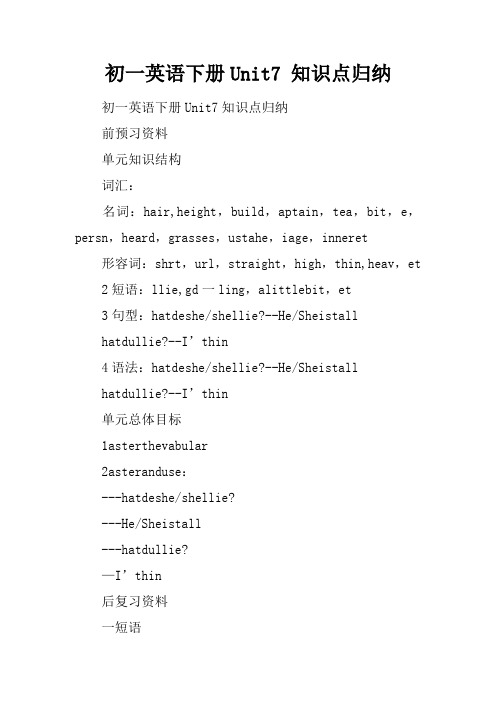
初一英语下册Unit7 知识点归纳初一英语下册Unit7知识点归纳前预习资料单元知识结构词汇:名词:hair,height,build,aptain,tea,bit,e,persn,heard,grasses,ustahe,iage,inneret 形容词:shrt,url,straight,high,thin,heav,et 2短语:llie,gd一ling,alittlebit,et3句型:hatdeshe/shellie?--He/Sheistallhatdullie?--I’thin4语法:hatdeshe/shellie?--He/Sheistallhatdullie?--I’thin单元总体目标1asterthevabular2asteranduse:---hatdeshe/shellie?---He/Sheistall---hatdullie?—I’thin后复习资料一短语1llie看起来像2url/shrt/straight/lnghair卷/短/直发3ediuheight/build中等高度/身体4alittlebit一点儿…appsinger一位流行歌手6haveanel呈现新面貌7gshpping去购物8theaptainfthebasetballtea 篮球队队长9beppularithsb为---所喜爱10nef------中的一个11stptdsth停下来去做某事12stpdingsth停止正在做的事情13telles/stries讲笑话/讲故事14havefundingsth愉快地做某事1reebertdsth记得做某事16reeberdingsth记得做过某事二本单元的重点句:1Isthaturfriend?N,itisn’t2hatdesshellie?3IthinInher4angLinistheaptainfthebasetballtea She’salittlebitquiet6XuQianlvesttelles7Sheneverstpstaling8Sheliesreadingandplainghess9Idn’tthinhe’ssgreat10Iangshppingandnbdnse11Nhehasanel三重难点解析1hatdes/d+主语+llie?询问某人的外貌特征,看上去什么样?Eg:hatdesurfriendllie?2形容头发时,可按照先长短,后曲直,最后说颜色的顺序说。
七年级下册英语7单元知识点
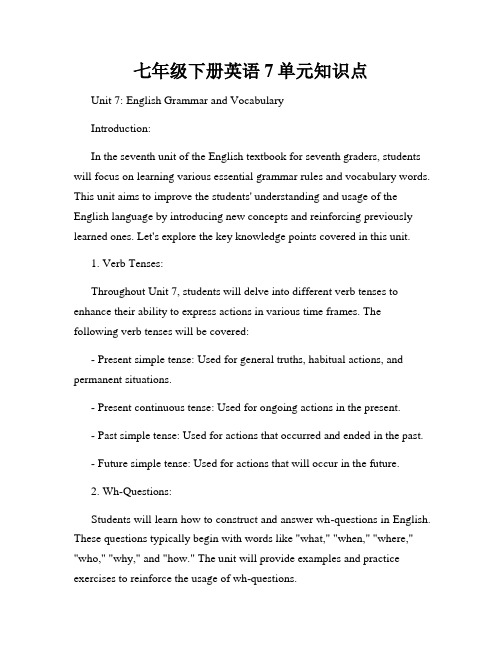
七年级下册英语7单元知识点Unit 7: English Grammar and VocabularyIntroduction:In the seventh unit of the English textbook for seventh graders, students will focus on learning various essential grammar rules and vocabulary words. This unit aims to improve the students' understanding and usage of the English language by introducing new concepts and reinforcing previously learned ones. Let's explore the key knowledge points covered in this unit.1. Verb Tenses:Throughout Unit 7, students will delve into different verb tenses to enhance their ability to express actions in various time frames. The following verb tenses will be covered:- Present simple tense: Used for general truths, habitual actions, and permanent situations.- Present continuous tense: Used for ongoing actions in the present.- Past simple tense: Used for actions that occurred and ended in the past.- Future simple tense: Used for actions that will occur in the future.2. Wh-Questions:Students will learn how to construct and answer wh-questions in English. These questions typically begin with words like "what," "when," "where," "who," "why," and "how." The unit will provide examples and practice exercises to reinforce the usage of wh-questions.3. Adverbs of Frequency:In this unit, students will gain an understanding of adverbs of frequency, which indicate how often an action occurs. Adverbs such as "always," "often," "sometimes," "rarely," and "never" will be explored. Students will learn how to use these adverbs to describe routines and habits.4. Comparative and Superlative Forms:The comparative and superlative forms of adjectives will be introduced. Students will learn how to compare and rank items or people using words like "bigger," "better," "more beautiful," "the most interesting," and so on.5. Vocabulary:Unit 7 will expand students' vocabulary by introducing new words and phrases related to various topics. Vocabulary words may include professions, hobbies, sports, food, transportation, and more. Students will practice using these words in sentences to enhance their vocabulary and communication skills.Conclusion:In Unit 7 of the seventh-grade English textbook, students will delve into important grammar rules and expand their vocabulary. From verb tenses and wh-questions to adverbs and comparative forms, students will acquire new knowledge and master essential language skills. By studying the content provided and completing practice exercises, students will enhance their understanding and usage of the English language, making significant progress in their language learning journey.。
Unit7+讲义 人教版英语七年级下册

Unit7 It’s raining!1.It’s raining!rain:v下雨;n雨(不可数名词)注意:作为不可数名词时,当它前面有heavy(大)/light(小)修饰时,形容词前要加冠词aEg:There was a heavy rain this morning.2.How’s the weather in Shanghai?对天气提问的句型:How’s the weather (in+地点)?What’s the weather like(in+地点)?答语:It is+形容词.(表天气)Eg:---How’s the weather in Wuhan?---It’s sunny.---What’s the weather like in Wuhan?---It’s sunny.由“名词+y”构成的天气形容词Eg:cloud(n云)---cloudy(adj 多云的)rain(n 雨)---rainy(adj 下雨的)wind(n 风)---windy(adj 有风的)sun(n 太阳)---sunny(adj 晴朗的)snow(n 雪)---snowy(adj 有雪的)storm(n 暴风雨)---stormy(adj 有暴风雨的)shower(n 阵雨)---showery(adj 有阵雨的)weather为不可数名词天气与weather相关的短语weather forecast/report 天气预报weatherman天气预报员感叹句:(1).What+(a/an)+adj+n+主谓!(2)How+adj/adv+主谓!Eg:What a fine day it is!How fine the day is!多么好的天气啊!3.Aunt Sally is cooking.cook:v 烹饪;煮n厨师cooker:厨具Eg:The cook is cooking with some cookers.用法:cook sth.for sb./ cook sb. sth.为某人做饭(同buy的用法)Eg:My mom is cooking a big dinner for us.My mom is cooking us a big dinner. 妈妈正在为我们做丰盛的晚餐4.How’s it going? 最近怎么样?询问对方近况/事情进展情况,可跟with sb./sth.相当于How is everything(going)?该用语的常见答语有:Great!Pretty good!(相当好) Not bad!(还不错)Just so-so!(一般般/马马虎虎) Terrible!(糟糕透了) Everything is going well.(一切都好)Eg:---How’s it going with your tests?--- Pretty good!注意:How are you doing? 你最近好吗?What are you doing? 你正在做什么?5.Can I take a message for him?message:(可数名词)消息;信息take a message for sb. 为某人捎个口信拓展与message相关的常用短语:take a message to sb.捎信给某人send a text message to sb.给某人发短信leave a message 留言6.Could you just tell him to call me back?could:(情态动词)能;可以(语气上比can委婉、客气)当could用于一般疑问句时,作肯定回答要用:Yes,...can. 也可用:Sure/Certainly/Yes,please.Eg:-Could you help me carry the box?-Sure.call sb.back 给某人回电话拓展与back相关短语come back 回来go back回去bring back 带回来take back 收回fight back 回击7.Sure,no problem.no problem没问题(道谢、道歉、询问能力等语境中)Eg:(1)-Thank you.-No problem.(没什么)(2)-I’m sorry.-No problem.(没关系)(3)-Can you do it?-No problem.(没问题)8.I’m having a great time visiting my aunt in Canada. visit: v 拜访,参观visit+sb. 拜访某人visit+地点参观某地visit: n 逗留、游览、参观常用短语:go on a visit to...去...参观pay a visit to sb.去某人处做客on a visit to去...游览visitor 访问者;参观者Canada(加拿大)---Canadian(加拿大人/加拿大人的) America(美国)---American(美国人/美国的)Russia(俄罗斯)---Russian(俄罗斯人/俄罗斯的)Europe(欧洲)---European(欧洲人/欧洲人的)9.Are you studying hard,or are you having fun?hard:adv 努力地;艰难地;猛烈地/ adj 坚硬的;困难的Eg:Young people should work hard.(努力地)It’s raining hard now.(猛烈地)The stones are too hard.(坚硬的)The maths problem is kind of hard.(困难的)注意:hard 本身有adv词性,hardly(adv)几乎不;几乎没有10.My family and and I are on a vacation in the mountains.on a vacation:在度假拓展:与vacation相关的短语on vacation 在度假take a vacation 度假Eg:Miss Yi is on vacation now.I will go to Yunnan to take a vacation.辨析:vacation,holiday,festival,leave,offvacation:学校、机关等假期(时间一般比较长)(美国)holiday:泛指休息日,常指较长时间的休假(英国)festival:指悠久历史的传统节日leave:(n)请假(被批准后离开一段时间)Eg:He asked for a six months’ leave.off:常用结构:have+时间+off 请假,休假Eg:I have half a month off every day.一般现在时VS现在进行时区别11.It’s hot in your country now,isn’t it?反意疑问句:由两部分构成:陈述句+附加问句遵循:前肯后否,前否后肯两部分的时态要保持一致,附加问句部分一般由“助动词/系动词/情态动词的肯定或否定形式+代词”,否定形式通常使用缩写形式Eg:It’s raining now,isn’t it?(正在下雨,不是吗?)She likes playing games,doesn’t she?(她喜欢打游戏,不是吗?)He can’t play basketball,can he?(他不会打篮球,是吗?)当反意疑问句的主句部分含有表示否定含义的never、little、few、no、hardly等词时,附加问句则用肯定形式Eg:They never watch TV on weekends, do they?There is little milk in the fridge,is there?My father hardly smokes,does he?反意疑问句的回答:(1)Yes,+肯定回答. No,+否定回答Eg: -She is a doctor, isn’t she?-Yes,she is. No,she isn’t.(2)如果前面的陈述部分为否定句的反意疑问句,回答时yes/no的翻译与通常情况正好相反-She isn’t a doctor, is she?(她不是医生,对吗?)-Yes,she is. / No,she isn’t.(不,她是。
七年级下册英语第七单元单词知识点

七年级下册英语第七单元单词知识点一、单元概述七年级下册英语第七单元的主题是“学校生活”,涵盖了与学校日常活动相关的词汇。
本单元的重点单词包括学科、学校设施、日常用品等。
通过学习本单元,学生可以更好地了解和描述学校生活,为日常交流提供便利。
二、重点单词解析1.单词列表本单元的重点单词包括:- subject:学科- campus:校园- library:图书馆- classroom:教室- cafeteria:食堂- playground:操场- school bag:书包- pen:笔- notebook:笔记本- ruler:尺子- eraser:橡皮2.单词用法及例句- subject:学科例句:My favorite subjects are math and English. - campus:校园例句:The campus is beautiful and clean.- library:图书馆例句:I spend a lot of time in the library.- classroom:教室例句:Our classroom is clean and bright.- cafeteria:食堂例句:We have lunch in the cafeteria.- playground:操场例句:We play sports on the playground.- school bag:书包例句:I carry my school bag to school every day. - pen:笔例句:I always bring a pen to class.- notebook:笔记本例句:I use a notebook to take notes.- ruler:尺子例句:The ruler is useful for math lessons.- eraser:橡皮例句:I always have an eraser with me.3.单词拓展- school:学校- student:学生- teacher:老师- education:教育- learning:学习- diploma:文凭- degree:学位三、记忆技巧与应用为了更好地记忆这些单词,我们可以将它们与日常生活场景相结合,如:- 当你去学校时,你可以看到campus(校园)、library(图书馆)、classroom(教室)等场所。
仁爱版英语七年级下册u7t1知识点
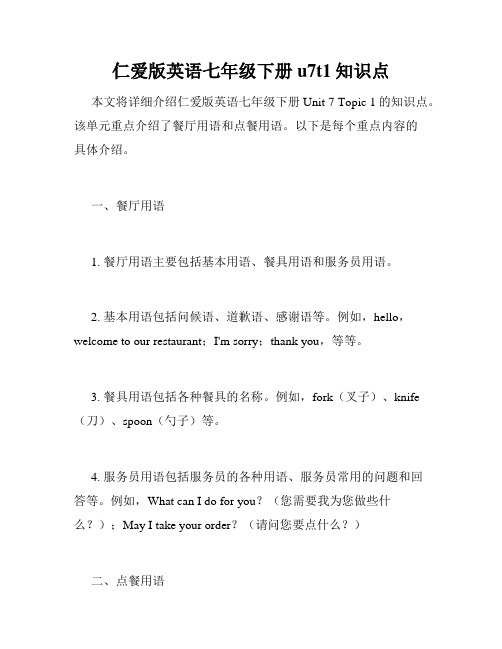
仁爱版英语七年级下册u7t1知识点本文将详细介绍仁爱版英语七年级下册Unit 7 Topic 1的知识点。
该单元重点介绍了餐厅用语和点餐用语。
以下是每个重点内容的
具体介绍。
一、餐厅用语
1. 餐厅用语主要包括基本用语、餐具用语和服务员用语。
2. 基本用语包括问候语、道歉语、感谢语等。
例如,hello,welcome to our restaurant;I'm sorry;thank you,等等。
3. 餐具用语包括各种餐具的名称。
例如,fork(叉子)、knife (刀)、spoon(勺子)等。
4. 服务员用语包括服务员的各种用语、服务员常用的问题和回
答等。
例如,What can I do for you?(您需要我为您做些什么?);May I take your order?(请问您要点什么?)
二、点餐用语
1. 点餐用语主要包括点餐流程和菜单翻译。
2. 点餐流程包括问询客人口味、点餐、确认菜单等。
例如,Could you please tell me your preference?(请问您喜欢什么口味?);I’d like to order...(我要点...);Is that all?(这些就够了吗?)
3. 菜单翻译包括菜名、酒水、套餐等的翻译。
例如,chicken salad(鸡肉沙拉);orange juice(橙汁);set menu(套餐)。
以上是仁爱版英语七年级下册Unit 7 Topic 1的知识点介绍。
希望本文对学习该单元的同学有所帮助,能够顺利掌握相关内容。
Unit7知识归纳人教版七年级英语下册
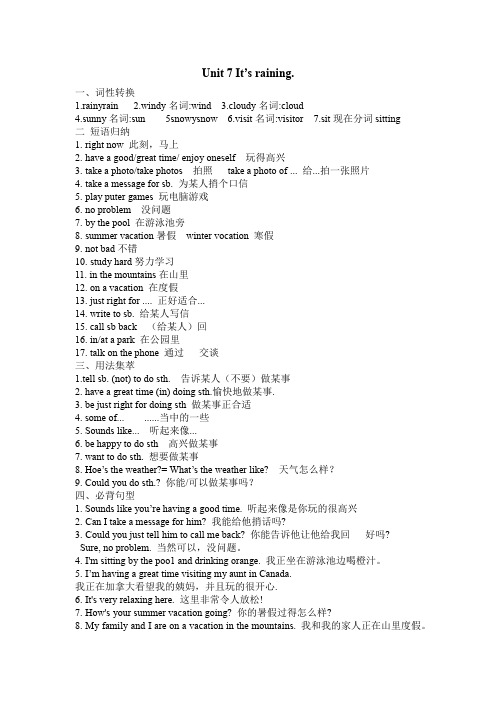
Unit 7 It’s raining.一、词性转换1.rainyrain2.windy名词:wind3.cloudy名词:cloud4.sunny名词:sun 5snowysnow 6.visit名词:visitor 7.sit现在分词sitting二短语归纳1.right now 此刻,马上2.have a good/great time/ enjoy oneself 玩得高兴3.take a photo/take photos 拍照take a photo of ... 给...拍一张照片4.take a message for sb. 为某人捎个口信5.play puter games 玩电脑游戏6.no problem 没问题7.by the pool 在游泳池旁8.summer vacation暑假winter vocation 寒假9.not bad不错10.study hard努力学习11. in the mountains在山里12. on a vacation 在度假13. just right for .... 正好适合...14. write to sb. 给某人写信15. call sb back (给某人)回16. in/at a park 在公园里17. talk on the phone 通过交谈三、用法集萃1.tell sb. (not) to do sth. 告诉某人(不要)做某事2. have a great time (in) doing sth.愉快地做某事.3. be just right for doing sth 做某事正合适4. some of... ......当中的一些5. Sounds like... 听起来像...6. be happy to do sth 高兴做某事7. want to do sth. 想要做某事8. Hoe’s the weather?= What’s the weather like? 天气怎么样?9. Could you do sth.? 你能/可以做某事吗?四、必背句型1. Sounds like you’re having a good time. 听起来像是你玩的很高兴2.Can I take a message for him? 我能给他捎话吗?3.Could you just tell him to call me back? 你能告诉他让他给我回好吗?Sure, no problem. 当然可以,没问题。
七年级下册英语七单元知识点总结
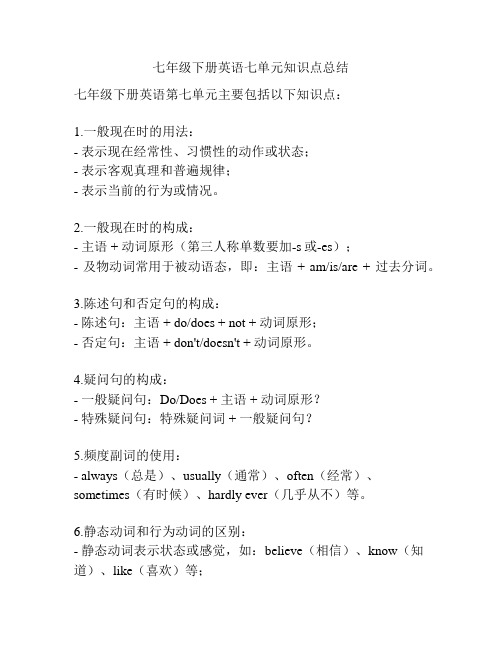
七年级下册英语七单元知识点总结
七年级下册英语第七单元主要包括以下知识点:
1.一般现在时的用法:
- 表示现在经常性、习惯性的动作或状态;
- 表示客观真理和普遍规律;
- 表示当前的行为或情况。
2.一般现在时的构成:
- 主语 + 动词原形(第三人称单数要加-s或-es);
- 及物动词常用于被动语态,即:主语+ am/is/are + 过去分词。
3.陈述句和否定句的构成:
- 陈述句:主语 + do/does + not + 动词原形;
- 否定句:主语 + don't/doesn't + 动词原形。
4.疑问句的构成:
- 一般疑问句:Do/Does + 主语 + 动词原形?
- 特殊疑问句:特殊疑问词 + 一般疑问句?
5.频度副词的使用:
- always(总是)、usually(通常)、often(经常)、sometimes(有时候)、hardly ever(几乎从不)等。
6.静态动词和行为动词的区别:
- 静态动词表示状态或感觉,如:believe(相信)、know(知道)、like(喜欢)等;
- 行为动词表示动作,如:do(做)、go(去)、play(玩)等。
7.句型转换:
- 肯定句变否定句:在动词前加not;
- 肯定句变疑问句:把动词调到句首,并使用助动词
do/does/did来提问。
总的来说,七年级下册英语第七单元主要包括一般现在时的用法、构成和句型转换,以及频度副词的使用等知识点。
七年级下册英语7单元知识点总结

七年级下册英语7单元知识点总结
前言
作为一名资深的创作者,我对于学习英语的重要性深有体会。
七年级英语下册第七单元是学习的重点,其中包含了多个知识点,本文将对这些知识点进行总结和归纳,希望能帮助同学们更好地掌握这些内容。
正文
1. 词汇部分
•本单元的词汇主要包括动物、颜色、数字等方面的词汇。
•同学们需要掌握这些词汇的中英文意思,能够辨认和朗读。
2. 语法部分
•本单元的语法主要涉及现在进行时的构成和用法。
•需要掌握现在进行时的肯定、否定和疑问句的构成方式。
•需要注意现在进行时的时间状语的使用。
3. 对话部分
•本单元的对话主要涉及询问某人正在做的事情和回答时表示正在进行的行为。
•需要掌握对话中常用的句子和表达方式,能够流利地进行日常的对话。
4. 阅读部分
•本单元的阅读主要涉及动物世界中的一些有趣的事实和故事。
•需要理解文章中的关键信息,能够回答相关的问题。
结尾
通过对七年级下册英语第七单元知识点的总结,同学们应该注意词汇的掌握、语法的运用、对话的熟练和阅读的理解。
希望同学们能够通过不断的练习和巩固,达到对这些知识点的熟练掌握。
相信在学习英语的路上,同学们一定能够取得优异的成绩!加油!。
人教七下英语Unit7单元重点语法
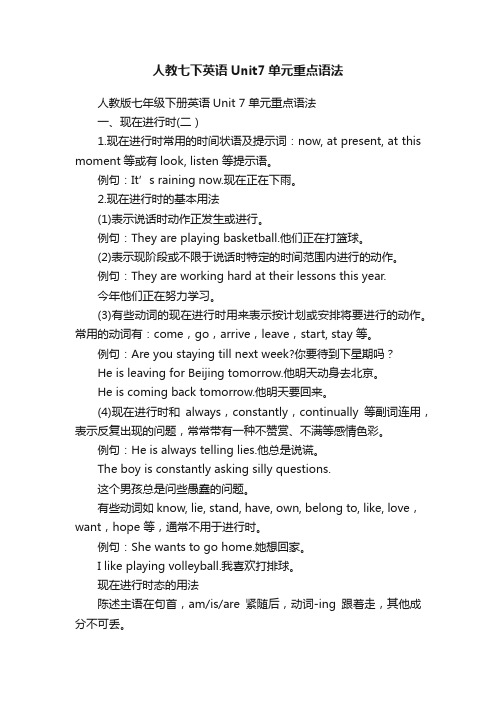
人教七下英语Unit7单元重点语法人教版七年级下册英语Unit 7 单元重点语法一、现在进行时(二)1.现在进行时常用的时间状语及提示词:now, at present, at this moment等或有look, listen 等提示语。
例句:It’s raining now.现在正在下雨。
2.现在进行时的基本用法(1)表示说话时动作正发生或进行。
例句:They are playing basketball.他们正在打篮球。
(2)表示现阶段或不限于说话时特定的时间范围内进行的动作。
例句:They are working hard at their lessons this year.今年他们正在努力学习。
(3)有些动词的现在进行时用来表示按计划或安排将要进行的动作。
常用的动词有:come,go,arrive,leave,start, stay 等。
例句:Are you staying till next week?你要待到下星期吗?He is leaving for Beijing tomorrow.他明天动身去北京。
He is coming back tomorrow.他明天要回来。
(4)现在进行时和always,constantly,continually等副词连用,表示反复出现的问题,常常带有一种不赞赏、不满等感情色彩。
例句:He is always telling lies.他总是说谎。
The boy is constantly asking silly questions.这个男孩总是问些愚蠢的问题。
有些动词如know, lie, stand, have, own, belong to, like, love,want,hope 等,通常不用于进行时。
例句:She wants to go home.她想回家。
I like playing volleyball.我喜欢打排球。
现在进行时态的用法陈述主语在句首,am/is/are紧随后,动词-ing跟着走,其他成分不可丢。
人教版英语七年级下册unit 7第七单元知识点

Unit 7 It’s raining1、raining 下雨〔1〕rain 动词,“下雨〞名词〔不可数〕,“雨水,雨〞例:There is a lot of rain here in summer.形容雨大时,用heavy〔2〕rainy 形容词,“下雨的〞〔3〕表示下雨时:There is rain in Beijing.It is raining in Beijing.It is rainy in Beijing.〔4〕snow/snowy2、How is the weather in Shanghai?〔1〕How is the weather?用来询问天气状况。
=What is the weather like?在句末加“介词+地点/时间〞等短语。
〔2〕weather不可数名词,“天气〞,不与不定冠词a/an连用。
whether是否3、cloud名词,“多云〞,cloudy形容词,“多云的〞。
sun名词,“太阳〞,sunny形容词,“晴朗的〞。
fog名词,“雾〞,foggy形容词,“多雾的〞。
4、cook不及物动词,“做饭〞及物动词,“煮,烹调〞,其后可接双宾语,cook sb. sth.=cook sth. for sb.名词,“厨师,炊事员〞cooker 名词,“厨具〞cooking名词,“烹饪,做饭〞do some cooking “做饭〞5、How is it going?用来询问对方处境或事情进展的习惯语,相当于“近况如何?〞,后接介词短语with sb./sth.同义句:How is everything?=How are things going?=How are you getting on?答复:Pretty good!/Great!/Not 〔too/so〕bad!还不错/Just so so一般般/Terrible6、Sounds like you are having a good time.〔1〕sound like “听起来像〞,后接名词,代词,句子。
- 1、下载文档前请自行甄别文档内容的完整性,平台不提供额外的编辑、内容补充、找答案等附加服务。
- 2、"仅部分预览"的文档,不可在线预览部分如存在完整性等问题,可反馈申请退款(可完整预览的文档不适用该条件!)。
- 3、如文档侵犯您的权益,请联系客服反馈,我们会尽快为您处理(人工客服工作时间:9:00-18:30)。
Unit 7 单元重点语法
一、现在进行时(二)
1.现在进行时常用的时间状语及提示词:now, at present, at this moment等或有look, listen 等提示语。
例句:It’s raining now.现在正在下雨。
2.现在进行时的基本用法
(1)表示说话时动作正发生或进行。
例句:They are playing basketball.他们正在打篮球。
(2)表示现阶段或不限于说话时特定的时间范围内进行的动作。
例句:They are working hard at their lessons this year.
今年他们正在努力学习。
(3)有些动词的现在进行时用来表示按计划或安排将要进行的动作。
常用的动词有:come,go,arrive,leave,start, stay 等。
例句:Are you staying till next week?你要待到下星期吗?
He is leaving for Beijing tomorrow.他明天动身去北京。
He is coming back tomorrow.他明天要回来。
(4)现在进行时和always,constantly,continually等副词连用,表示反复出现的问题,常常带有一种不赞赏、不满等感情色彩。
例句:He is always telling lies.他总是说谎。
The boy is constantly asking silly questions.
这个男孩总是问些愚蠢的问题。
有些动词如know, lie, stand, have, own, belong to, like, love,want,hope 等,通常不用于进行时。
例句:She wants to go home.她想回家。
I like playing volleyball.我喜欢打排球。
现在进行时态的用法
陈述主语在句首,am/is/are紧随后,动词-ing跟着走,其他成分不可丢。
表示动作正进行,句中now把时间定。
如要用来表计划,位移动词来搞定。
二、谈论天气
1.常见的询问天气的句型有:“How’s the weather?”/“What’s the weather like?”。
两个句型后面都可以加“in+地点”,用以询问“某地天气如何”。
例句:—How’s the weather in Shenzhen? 深圳的天气怎么样?
—It’s fine. 晴朗。
—What’s the weather like in Yunnan? 云南的天气怎么样?
—It’s windy. 多风的。
2.回答询问天气状况的问句时,通常用:It’s+表示天气的形容词.”,也可以用现在进行时进行回答。
常见的该类形容词有:fine (晴朗的),dry (干燥的),warm (温暖的),cold (寒冷的),cool (凉爽的),hot (热的),rainy (下雨的),snowy
(下雪的),sunny (晴朗的),cloudy (多云的)等。
例句:—How’s the weather in your city? 你所在的城市天气怎么样?
—It’s warm. 很暖和。
—What’s the weather like in Shandong? 山东的天气怎么样?
—It’s snowing now. 在下雪。
